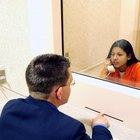
NADOFOTOS/iStock/Getty Images
Many people who find themselves in an abusive relationship do not realize how damaging it can be. Abuse typically occurring in a partnership or marriage can be physical, psychological or sexual. The effects of suffering any type of intimate partner violence can influence quality of life and general well-being for you, your partner and any other family members directly involved with the relationship. Understanding the potential consequences of abuse may help you acknowledge the importance of changing or leaving the situation.
Physical Damage
Physical abuse can result in temporary pain, long-term injuries and even death. Bruises, broken bones and concussions are some common immediate results of physical aggression. Ongoing problems may include headaches, gynecological issues, back pain or digestive problems, according to the article “Intimate Partner Violence and Physical Health Consequences,” published by the American Medical Association. Long-term exposure to abuse can also put you at risk for developing permanent health concerns and can result in death or disability.
Psychological and Emotional Turmoil
Abuse can increase your chances of suffering from depression, suicidal thoughts, post traumatic stress disorder or substance abuse, says a study published in the "Journal of Women’s Health." The fear and anxiety that can result from being abused or continuously threatened can also make it difficult to extract yourself from the relationship. It is important to remember that even though the psychological and emotional consequences of abuse cannot be physically seen, they can be equally or more harmful to your well-being.
Social Impairment
Forced social isolation is a form of abuse characterized by keeping the victim away from friends or family members who could potentially help. Even without this direct attempt to disconnect you from social contacts, abuse can interfere in other ways, as the physical and psychological consequences of abuse can make you feel unsure of yourself or awkward in social situations. Victims also commonly experience embarrassment or guilt about their situation, which can deter them from interacting with others or seeking help, according to Vera E. Mouradian, of the National Violence Against Women Prevention Research Center.
Harm to Children
Witnessing violence can increase the chances that your child may display behavioral, social, emotional or cognitive problems. Exposure to abuse can also result in your child believing abuse and violence are acceptable responses to conflict, says Judith McFarland and colleagues in an article published in the "Journal of Pediatrics." You should also remember that abuse may eventually be directed towards your child, even if it is not in the beginning.
Related Articles

Aggressive Behavior in Adults

Characteristics of a Verbally Abusive ...

Emotional Bullying in a Marriage

The Effects of Lack of Communication in ...

How Children Are Affected When Living ...

Psychological Effects of Cheating

The Negative Effects of Jealousy

What Is Healthy Jealousy?

Emotional Effects of Unresolved Issues ...

How to Overcome an Abusive ...

Symptoms of Adult Survivors of Child ...

10 Steps to Overcoming an Abusive ...

How to Report Elderly Abuse in Tennessee

Traumatic Effects of a Bad Marriage on ...

How Relationships Can Cause Depression

What Is a Harmful Relationship?

Forgiving an Abusive Husband

Factors Contributing to a Divorce

Psychological Effects of Fatherlessness

Lasting Effects on Adult Children of ...
References
- Medical University of South Carolina: Abuse in Intimate Relationships: Defining the Multiple Dimensions and Terms
- Psychology Today: Why do People Stay in Abusive Relationships?
- American Family Physician: Witnessing Domestic Violence: The Effect on Children
- Center for Disease Control: Intimate Partner Violence Consequences
- Center for Disease Control: Intimate Partner Violence
Writer Bio
Ayra Moore is a professional writer who holds a Masters of Science in forensic psychology with a specialty in mental health applications. She also obtained a Bachelor of Arts in general psychology and criminal justice from Georgia State University. Moore worked for two years with at-risk teenagers in a therapeutic setting.
Photo Credits
NADOFOTOS/iStock/Getty Images